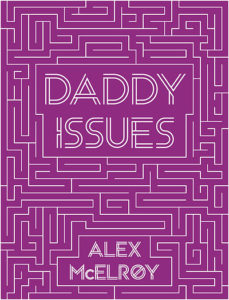Alex McElroy’s Daddy Issues
September 6, 2017, by Matthew Krajniak
 Alex McElroy, an Inprint Brown Foundation Fellow, has accomplished much as a writer: his work appears or is forthcoming in The Atlantic, Black Warrior Review, Tin House, The Kenyon Review Online and numerable other respected journals; he is currently a Fiction Editor for Gulf Coast; and he was awarded the 2016 Neutrino Prize from Passages North. What he can now add to his impressive CV is a book, specifically his chapbook, Daddy Issues, which, oh by the way, won the 2016 Editors’ Prize from The Cupboard Pamphlet. He’ll be reading at Brazos Bookstore on Friday, Sept. 8 at 7 pm, so I caught up with this busy man to ask him some questions about this latest accomplishment. Here’s what the handsome man had to say.
Alex McElroy, an Inprint Brown Foundation Fellow, has accomplished much as a writer: his work appears or is forthcoming in The Atlantic, Black Warrior Review, Tin House, The Kenyon Review Online and numerable other respected journals; he is currently a Fiction Editor for Gulf Coast; and he was awarded the 2016 Neutrino Prize from Passages North. What he can now add to his impressive CV is a book, specifically his chapbook, Daddy Issues, which, oh by the way, won the 2016 Editors’ Prize from The Cupboard Pamphlet. He’ll be reading at Brazos Bookstore on Friday, Sept. 8 at 7 pm, so I caught up with this busy man to ask him some questions about this latest accomplishment. Here’s what the handsome man had to say.
MATTHEW KRAJNIAK: Daddy Issues is a chapbook, which is a kind of publication that people may not be familiar with or typically associate with fiction. What exactly is a chapbook and how did this work come to be so?
ALEX McELROY: Chapbooks are normally shorter than full-length collections—and, like you said, they’re often associated with poetry rather than prose. In my case, I chose to write a chapbook because I had a series of stories that didn’t fit into a full collection—tonally, thematically—but which worked together quite well. I didn’t want to give up on those stories just because they weren’t right for a larger collection. So, I gathered them into a chapbook. Publishing Daddy Issues was an opportunity for the stories to speak to each other without forcing them into a full-length collection of stories. Here, the subject matter and themes feel more concentrated than they might in a larger book. And I’m very glad that the pieces were able to find a home together in Daddy Issues. Continue reading



 Last month, Susan Briante visited Houston as featured guest of the
Last month, Susan Briante visited Houston as featured guest of the